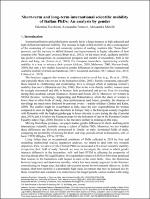Chapter Short-term and long-term international scientific mobility of Italian PhDs: An analysis by gender
| dc.contributor.author | Tocchioni, Valentina | |
| dc.contributor.author | Petrucci, Alessandra | |
| dc.contributor.author | Minello, Alessandra | |
| dc.date.accessioned | 2022-06-01T12:19:56Z | |
| dc.date.available | 2022-06-01T12:19:56Z | |
| dc.date.issued | 2021 | |
| dc.identifier | ONIX_20220601_9788855183048_525 | |
| dc.identifier.issn | 2704-5846 | |
| dc.identifier.uri | https://library.oapen.org/handle/20.500.12657/56340 | |
| dc.description.abstract | In the last years, there has been a large increase in high-educated and high-skilled people’s mobility as a consequence of the internationalization and globalization, the weakening of research and university systems of sending countries (the “brain drain” process), the increase in skilled demand and improvements in higher education of host countries (the “brain gain” process). At the micro-level, academic mobility has positive consequences on occupational prospects and careers of researchers, both in the short- and long- run. Nevertheless, numerous research studies have demonstrated the challenges of engaging in international academic mobility for people with caring responsibilities, particularly women. Using Italian data on occupational conditions of PhDs collected in 2018 by Istat and modelling multinomial logistic regression analyses, we intend to verify if female researchers are associated with a lower international mobility irrespective their field of study, and the extent to which gender interacts differently in the various fields of study in affecting the probability of moving abroad after PhD qualification. Also, the distinction between long-term and short-term mobility, which has been mainly neglected in the literature concentrating on longer stays, has taken into account. In this respect, short-term mobility is a potentially high-value investment that may be pursued also by those researchers and scientists who cannot move for longer periods, such as women with caring responsibilities. In the literature, it is acknowledged that an experience abroad during early career may have positive effects on future occupational prospects. With our work, we intend to shed light on potential disparities on moving abroad that may exist among researchers in their early career by gender, and which could contribute to leave behind women in academia. | |
| dc.language | English | |
| dc.relation.ispartofseries | Proceedings e report | |
| dc.subject.other | PhD | |
| dc.subject.other | international mobility | |
| dc.subject.other | gender | |
| dc.subject.other | higher education | |
| dc.subject.other | logistic regression | |
| dc.title | Chapter Short-term and long-term international scientific mobility of Italian PhDs: An analysis by gender | |
| dc.type | chapter | |
| oapen.identifier.doi | 10.36253/978-88-5518-304-8.08 | |
| oapen.relation.isPublishedBy | bf65d21a-78e5-4ba2-983a-dbfa90962870 | |
| oapen.relation.isbn | 9788855183048 | |
| oapen.series.number | 127 | |
| oapen.pages | 6 | |
| oapen.place.publication | Florence |

